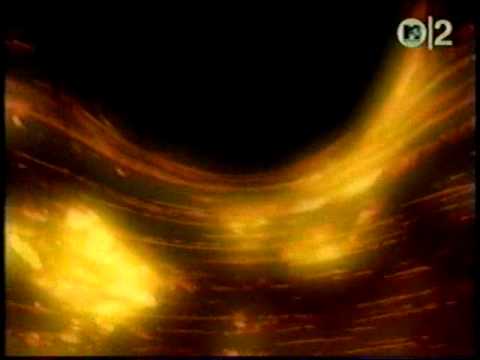Somewhere in my personal archives is the interview I did with Franz Treichler of the Young Gods 25 years back, when Only Heaven came out. It was a phoner, but I met Treichler briefly before the show he and the band did for that album in Los Angeles. In both cases he was affable, thoughtful, energetic, the type of person you could pretty easily imagine chatting with in a variety of contexts. He could have almost fit the image of a bro on the beach in SoCal to an extent. That’s part of the reason why the show they did was so fantastic – even if you don’t quite expect your head to be torn off after such an exchange, when a band goes ahead and does it in front of your face, that’s a sign. You know you’re in the right spot at the right time.
Where I was in America, Only Heaven was the crossover moment for the Young Gods – where the work they’d already done over a previous decade culminated and theoretically could have broken through. It was on Interscope, then riding the era’s waves ridiculously high on a number of fronts, from Dre and Snoop via Death Row to, most relevantly in this case, Nine Inch Nails. Trent Reznor’s announced that plans for the Interscope-distributed Nothing Records (as a home for his own favoured artists) were already in the works. He won a first feather for his cap after signing and producing one Marilyn Manson. When I first heard about Only Heaven I figured this was part and parcel with Nothing as well. Such wasn’t the case, but seeing as the Young Gods had been subsumed into a general definition of ‘industrial’ here over the previous years, thanks to Wax Trax distribution and the like, it seemed like it could happen.
But that was the point of the Young Gods – they didn’t fit into anything. They were near sui generis – hell, they flat out were. The combination of wider international distribution, technological possibilities and that always necessary spark of some genius allowed them to come almost crashing out of the gate with something that didn’t many any ‘sense’ as such, and then completely did soon after. In an interview from earlier this year, Treichler discussed his young fascination with classic and punk rock, his schooling in classical guitar, his love of hip hop from early on, as well as adding this: "[W]hen you watch a band, you can anticipate most of the time what’s going to happen because you physically see the guitar. You see he’s going to play. If you have all this on the keyboard, you never know what’s going to come next. Is it going to be a wall of guitars? Is it going to be violent? Is it going to be pleasant? It puts you back to a state where it’s like the first time you’re listening to music because you don’t know what it is."
And from the debut single ‘Envoye!’ forward, that’s what happened. At a time even then when a certain sort-of guitars and drum machines orthodoxy was emerging, it was the combination of sampling, live drumming, Rosi Mosimann’s mentor role and production and Treichler’s rough, roaring vocals – almost all initially in French – that turned heads and rewired possibilities. Much was made rhetorically of how the Young Gods took ‘metal’ as concept – riffs, bursts, melodies, sometimes mere moments of a solo – and turned what was seen as lumpen into quicksilver. It was a reduction, but there was a logic to it in turn. As dedicated to the studio as an instrument as any other avant-garde performer at the time, the Young Gods matched in with performances that felt like rock & roll but didn’t look like it or seem like it, a constant disorientation. Even if the medium of recorded music removed that element of surprise Treichler outlined – you could consider it a ‘classic’ instrumental lineup on initial blush – there was still something unexpected. It could be the way parts cut too quickly for the human hand to play, that brutal loops and twists evolved and tore through arrangements. Add to that a voice that, for many, was the first time they’d heard a French voice sing over and with heavy as hell music and it’s no surprise they made a mark.
There’s an interesting thing about Only Heaven at that stage in the band’s career to consider, beyond the fact that they’d settled into a sharp trio line-up of Treichler, keyboardist Al Monod and drummer Üse Hiestand. After their perfect headfuck move with the Sings Kurt Weill album, transforming the work of the mid 20th century songwriting legend into their own sonic universe, 1992’s TV Sky was, in many ways, their most American album to date. There was the ZZ Top electric blues kick of ‘Gasoline Man’ to ‘The Night Dance’’s brawling punch and careful use of an iconic Guns N’ Roses part to the explicitly Doors-referencing ‘Summer Eyes’ – the latter concluding the album with Treichler’s majestic howl of "America! America! The flowers need water!" over a slow burn fade. It almost felt like the record that a big American record deal should have produced, a knowing grasping of the bull by the horns. Having done that, and avoiding repeating themselves, it makes Only Heaven its own distinct effort – something that, per Treichler’s quote above, was a reflection that one never knew what would come next.
If songs like ‘Gasoline Man’ demonstrated that the group could do pop-rock numbers on their own terms, a song like ‘Strangel’ added to that all the more, with a chugging base charge, a clipped snarl of a guitar figure as a recurrent motif, and an instantly catchy, strong chorus. But being followed up by the explosive ‘Speed Of Night’ was something else again. With a huge cascade of samples somewhere between Joey Beltram’s mentasm riffs played backward to start, the arrangement suddenly blew open and out into a focused bass/drum charge. It felt like nothing so much as an open-ended chase down city streets at high propulsion, Hiestand’s drumming a live wire. Treichler doesn’t so much sing the verses as deliver them as observations, a drive riding rails almost beyond his control and locking down in order to keep some sense of focus and sanity, then breaking out on the verses with an agog wonder at everything flowing through and past him. Being able to capture the impact of what a song itself is actually doing is not the easiest of tasks, but it’s a fusion here that might as well be Kraftwerk at its own propulsive height, capturing and interpreting the moment.
Then there’s ‘Kissing The Sun’, a single from the album and understandably so. There’s no one lyrical high point for the Young Gods – in French or English they seemed to have a knack for invoking the elemental in a way that made it all feel like it was actually happening. But this has a perfect title, a kind of Icarus-in-excelsis who didn’t fall from the heights but kept on laughingly going all the way, high off everything. The song varies from quick dizzying upward spirals, notes rising in an echo as Treichler delivers two quick lines in each verse, then a huge cutting slam on guitar matched by blasting drums like whoever the kisser is has taken a massive dive right past a flare. Breaks and bridges allow Treichler to deliver the title line – notably, he says "we’ll be kissing the sun", inviting everyone, "boys and girls", along with him, rather than revelling in a solo power trip.
For all the noise, a quieter mood never disappears. It was something that was always part of the Young Gods approach but sometimes understandably was lost in the sheer frenzy of their loudest and most extreme moments. ‘Donner Les Esprit’ is slow loping mood, textures and sounds bubbling in and around a mix, less interested in guitars directly as the sounds that can be extracted from them and other sources. Keening tones, distant cascades, the feeling of an irregular series of waves on a beach and more besides all come together. ‘Lointaine’ is almost nothing but Treichler’s singing and a nervy loop from some unclear source, shadows and fog and ghosts of feedback shimmering past and back again. ‘Outside’ and ‘Gardez Les Esprit’ almost bookend the album with quick, minimal approaches that’s almost nothing but Treichler and a bit of rhythm in both cases. ‘The Dreamhouse’ almost feels like something from the Aphex Twin’s Selected Ambient Works Volume II from the previous year, all squelching loops, high wailing drones and barely there rhythms, Treichler’s whisper. Things start to fire up and coalesce towards the middle of the song, but the sense of initial disorientation remains paramount, so when it all drops away again, the feeling is of unresolved suspension.
Like TV Sky, Only Heaven had a lengthy track as a key part of the whole, but where ‘Summer Eyes’ concluded the earlier album as a grand, angrily formalist gesture towards classic rock as such, ‘Moon Revolutions’ is something else again. It’s smack dab in the centre of the collection and divides the album almost exactly in half. A distant riff behind a combination of drums and another rhythmic sample heralds another Treichler lyric about motion and action. Moon revolutions can be about a revolution in the common sense if you like but its origin is astronomical, a progression of a huge globe in space around another and the cycles that invokes in turn. It all slowly builds up in vocal and instrumental intensity even as the rhythm holds the line and then, seemingly nothing. By floating into pure ambient exploration – something the band did even more thoroughly on the companion album, Heaven Deconstruction – it’s another distinct contrast from what was expected of the group. But the context feels like the top of an arc of a space launch, tones and shards of feedback and guitar flying past before a long slow downward plunge. It just gets more dramatic and powerful as it goes, a guitar chug, drumming building up, ever more dramatic riffs placed just so, Treichler moving from observational moments to a commanding invocation of the titular figure. It seems like everything is going to impact at beyond light speed, only it pulls a little bit of a twist by fading away into serenity. Why not continue to surprise?
And they continued to surprise right through to the end. ‘Child In A Tree’ concluded the album on the gentlest note for the band yet, with the lead being acoustic guitar rather than electronic riffs and reworking – practically a folk song, or more accurately a lament. There’s soft touches of electric elements in the background, but otherwise it has the feeling of what’s been an awesomely powerful machine suddenly stripped down to basics. Even Treichler’s voice takes on its softest edge – there’s no leering swagger or commanding urge to power, or even murmuring restraint. Reportedly inspired by the early death of a friend of Treichler’s, it’s not maudlin or weepy, but it is exhausted in its sorrow, and he sings it in an almost hard to hear, high pitched half-gasp, tender and lost. But even its two minutes isn’t quite the end, as a further combination of ambient tones dissipating into calm eschews all the extremity at one end of their sound for something completely removed. It’s not even the arcing top of ‘Moon Revolutions’’s progression, more simply a empty end and finality.
Seeing the Young Gods that year at last was a definite revelation, getting a sense of how such a combination actually worked on stage instead of dreaming it or just guessing via videos. I remember Monod’s careful intensity on his keyboards – he wasn’t simply triggering guitars, he was playing the whole thing, creating all the bombast and tone – and Hiestand’s drumming was at its most extreme a classic full wallop, not so much overbearing as a punch and pulse in the gut. And Treichler, sometimes lost in the flow but never to the point where he wasn’t singing every line just so, aiming to will a feeling into existence among the usual enough LA crowd of hardcore fans and label folks and just people out in a club all in a mix. More than once it seemed like he was flying without leaving the ground, and more than once, I felt like we were all there with all three of them.




